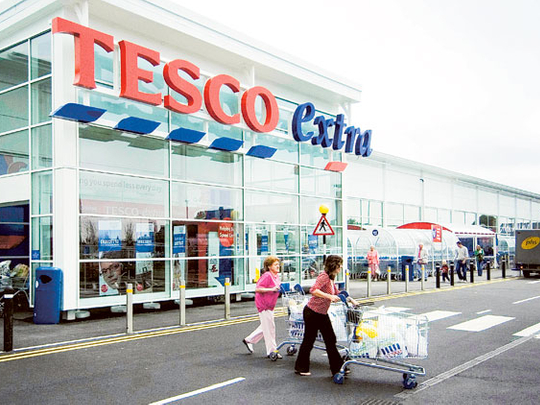
London: Tesco is planning to build thousands of homes on land previously earmarked for supermarkets.
The chain owns vast areas of undeveloped land across the UK and will now use it to build 4,000 properties.
The decision comes as Tesco shifts its focus from large out-of-town supermarkets to smaller convenience stores and online retail.
Last month it was revealed that Britain’s biggest retailer was hoarding more than 1,000 acres of undeveloped land, after buying hundreds of out-of-town sites during the 1990s and 2000s, most of which were earmarked for Tesco Extra hypermarkets.
But last year the company wrote down the value of its land by £800 million (Dh5.02 billion) after admitting that much of it would never be built on.
It is estimated that Tesco owns 310 undeveloped sites across Britain, which could be used to build 15,000 homes.
Now, the retailer has scheduled that 4,000 homes will be built on its land by 2017, according to Property Week magazine.
Tesco, which has a £20 billion property portfolio, has yet to decide whether to sell the land to developers or build the homes itself, using developer Spenhill, which it owns. A Tesco spokeman said: “We are currently working on plans for over 4,000 homes across the UK, either by building them ourselves or selling our sites to housing developers.
“In places where we have already delivered housing schemes, for example in Faversham or Highams Park, the feedback from local communities and councils has been very positive. We are pleased to be bringing new investment to communities up and down the country and playing our part in meeting local housing needs over the coming years.”
Last month Tesco announced its worst results for 20 years, with sales falling by 3.8 per cent over the past three months.
Out-of-town supermarkets have seen sales decline as British shoppers give up their big weekly visits and turn to smaller convenience stores and online retailers.
Restaurants
German discounters Aldi and Lidl have also provided competition to the supermarkets.
As a result, Tesco is slowing down its stores opening programme and revamping its existing hypermarkets by installing restaurants, coffee shops and bakeries. The company said: “As we have previously announced, in response to changing customer shopping habits we have decided to reduce the amount of new store space we build each year, building fewer large stores.
“Where we no longer intend to develop sites, we sell them, lease them or develop them for housing.”











